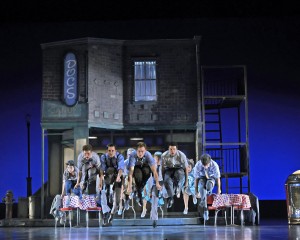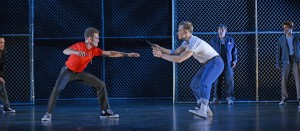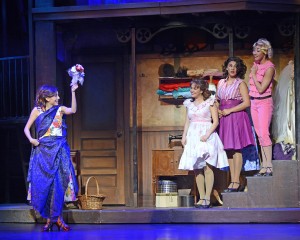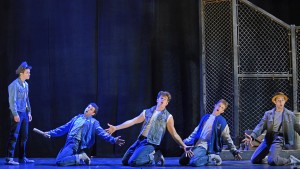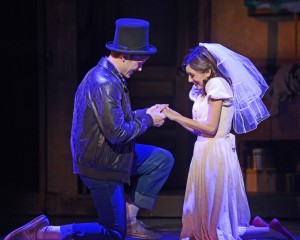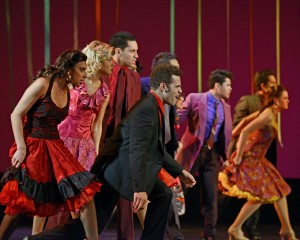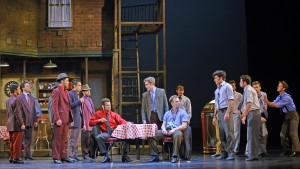SOMEWHAT FORCED, WE STILL
GET THE GLORY OF WEST SIDE STORY
Strangely enough, West Side Story feels more dated than Romeo and Juliet, its 500-year-old inspiration. Compared to Shakespeare’s dedicated tragedy, the musical is less violent, claiming only three lives to the Bard’s five (although, in the second act, one character barely escapes being raped). And while these juvenile delinquents are still smarmy to authority figures, they are quaint compared to today’s drive-by gangster-wannabes: The Jets and Sharks in Arthur Laurents’ libretto request each other’s permission to use switchblades at their rumble; their worst epithets are “buggin” or “Krup you!”; and instead of pulling a gun out of their pocket, they point a finger and say, “Pow! Pow!” Thus, the material needs to be handled with all the seriousness in the world.
Musical Theatre West’s revival, as hard-hitting as some of it is, loses a bit of emotional power with some unnecessarily cartoonish and/or forced portrayals with more than a few actors mistaking screaming for emotion (and they’re MIKED!!!). Director Joe Langworth clearly had his hands full with 32 cast members, a 30-piece orchestra (a joy to hear under David Lamoureux’s kick-ass conducting), and only 3 weeks of rehearsal, so the needed nuance may appear as the short, and already popular, run progresses.
Yet the trenchant dialogue of these young gang members feuding for a claim to their neighborhood still sizzles, given the fiery — if not a bit frenetic — staging, aided by the extraordinary unleashing of energy from an exuberant cast. What it lacks in grace, it more than makes up for in purity. And what a relief that MTW happily eliminates Laurents’ decision from the most recent national tour to use copious Spanish in the scenes and songs by the Sharks and their supporters (that bi-lingual touch may have reinforced the differences between the clashing communities on stage, but it was confusing, distracting, and more trouble than it was worth to the audience).
The uncredited sets (Technical Director Kevin Clowes) benefit from a forced perspective technique not unlike Main Street at Disneyland. The diminutive design, rotating for different scenes on a moveable turntable, actually heightens the drama of the tragic love story, but it does make for some clunky entrances and exits in doorways and on stairs. Strangely, Jean Yves Tessier’s lights were not utilized to make up for the sprawl left on stage, especially evident in the gym and ballet dances.
Faithful to the sexy strutting of Jerome Robbins’ original dances but emphasizing the athleticism over the romanticism of these violent mash-ups, Hector Guerrero’s “reproduced” choreography reprises the hot jazz in “Cool,” sets fire to the menacing “Mambo,” and turns the haunting “Somewhere” dream ballet into a redemptive promenade for peace.
The inexhaustible dynamos on stage execute the vigorous dancing while pile-driving Leonard Bernstein’s too-hot-to-handle music and the many moods of Stephen Sondheim’s lyrics. The hot, young troupe tears into the hormonal turf dancing of the anthemic “Jets Song” and an equally combative dance competition, but then eases into the lovers’ heartbreaking Act Two elegiac fantasy of the happy ending that this world will not permit. The sure-fire storytelling behind every movement in “America” and “Gee, Officer Krupke” are matched by the almost scary youthfulness that bursts through their seams.
Poleaxed by passion, both Michael Spaziani as Tony and Ashley Marie as Maria redefine infatuation in a hundred different ways. Strong and settled in, Spaziani, his steady tenor matched by his good looks, brings ardent impetuosity to his gangbanger-next-door, playing Tony as if, yes, “Something’s Coming” but he can’t tell what; playing the moment is the only way to do Tony. A vision in white, Marie’s Maria is a Madonna who’”having to grow up fast’”prefers to be un-immaculate; Ms. Marie reconfirms true-believing Maria’s awesome hopefulness (“I Feel Pretty”), bringing an achingly sweet soprano to this vulnerable survivor.
Surrounding the lovers with hate, Tyler Matthew Burk’s rough-and-ready Riff is a spunky contrast to Cooper Howell’s Bernardo and his self-defeating machismo and complete lack of anger management, even as Howell is somewhat anglicized. Lauren Boyd, the only lead character who is a member of Equity, offers a kinetic Anita, Bernardo’s girlfriend, who struggles to rise above that hate; Boyd nobly captures the strong woman’s ambivalence while offering the best kicks in the entire ensemble.
This earnest production has practically everything it needs to make a revival worthwhile. But it’s that full orchestra that will make anyone happy to be alive. I’m so grateful to MTW; I get to hear the orchestrations and arrangements exactly as they were heard on opening night in 1957.
photos by Caught in the Moment Photography
West Side Story
Musical Theatre West
Richard and Karen Carpenter Performing Arts Center in Long Beach
ends on February 28, 2016
for tickets, call (562) 856-1999 or visit Musical

